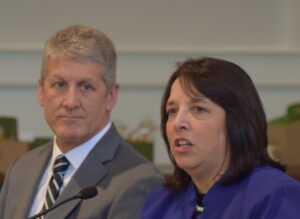Who is a member?
Our members are the local governments of Massachusetts and their elected and appointed leadership.

Lt. Gov. Kim Driscoll (right) urges local leaders to keep advocating for passage of the administration’s Municipal Empowerment Act during the May 14 meeting of the Local Government Advisory Commission in Westborough. Also pictured is Franklin Town Administrator Jamie Hellen.
With the clock winding down on the current legislative session, state and local leaders are continuing their advocacy for a key piece of legislation that would improve municipal operations without adding costs to the state’s bottom line: the Municipal Empowerment Act.
The wide-ranging bill, filed by Gov. Maura Healey on Jan. 22, intends to increase municipal flexibility, reduce administrative burdens, strengthen municipal finances, address municipal workforce challenges, and improve the efficiency of local operations.
The legislation was a central topic during the May 14 meeting of the Local Government Advisory Commission, when local leaders from across the state expressed their appreciation to the administration for drafting and filing the bill.
“The Municipal Empowerment Act is a very big deal for cities and towns,” said Franklin Town Administrator Jamie Hellen, who’s also vice president of the MMA. “It’s about making a more efficient government and modernizing the essential services provided to residents throughout the Commonwealth.”
Easthampton Mayor Nicole LaChapelle said the bill’s local-option revenue provisions would help to relieve fiscal pressures being faced by communities across Massachusetts.
“We remain really excited about this bill,” replied Lt. Gov. Kim Driscoll. “It’s really going to be incumbent upon all of us to make sure this doesn’t get lost in the sauce” during the busy final weeks of the formal legislative session, which is scheduled to end on July 31.
Among its many provisions, the Municipal Empowerment Act would reform procurement rules and update borrowing rules for school projects; make permanent a number of popular pandemic-era allowances for remote or hybrid public meetings; and establish enforcement mechanisms for prohibitions on doubled-up utility poles. It would also allow cities and towns, which face state-imposed caps on local revenue raising, to increase local-option meals and lodging taxes and create a new local-option motor vehicle excise surcharge.
A new commission would be established to take a fresh look at opportunities to address unfunded liabilities from non-pension employee benefits (known as OPEB), and municipalities would be able to offer a means-tested senior property tax exemption.
The bill was the subject of two legislative hearings this spring — before the Joint Committee on Municipalities and Regional Government on Feb. 28 and before the Joint Committee on Revenue on Feb. 29 — but the committees have not yet released the bill.
Healey and Driscoll announced the legislation during the MMA Annual Meeting & Trade Show in Boston on Jan. 19, and received a strongly enthusiastic response from roughly 1,000 local leaders in the room. Driscoll said the package is based on input from local officials during a listening tour she conducted around the state last fall, when she heard from more than 130 town managers and mayors representing 112 municipalities, as well as professional associations representing local leaders and employees.
Local revenues and procurement
The Municipal Empowerment Act would enable communities, at local option, to increase the local meals tax from 0.75% to 1%, and increase the local lodging tax from 6% to 7% (6.5% to 7.5% in Boston). Currently, 251 municipalities have adopted a local meals tax, and 216 have a local lodging tax. The rate ceilings haven’t changed since the original legislation in 2009.
A new local-option vehicle excise tax surcharge of 5% would be available to all 351 municipalities.
In the area of procurement reforms, the bill would:
• Raise thresholds for competitive bids and remove onerous publishing requirements
• Clarify that Chapter 30B enables groups of cities and towns to award multiple contracts through the request for proposals process and purchase both supplies and services from collectively bid contracts
• Equalize 30B thresholds for advertised procurements to $100,000 for all municipal purchasing, not just schools
• Eliminate the requirement to publish notice of invitations for competitive bids on COMMBUYS
• Streamline procurement for electric school buses and charging infrastructure by allowing single procurements for both under Chapter 30B
Additional provisions
Additional provisions of the Municipal Empowerment Act would do the following:
• Allow cities and towns to amortize emergency deficit spending over three years
• Modernize annual town report printing requirements
• Expand the process for seeking exemptions to post-retirement employment rules
• Allow regional boards of assessors
• Enable cities to form Veterans’ Districts
• Equalize the rules for property tax appeals (among residents and commercial taxpayers)
• Permit more efficient setting of revolving fund spending caps
• Close unemployment insurance loopholes
• Simplify election cost reimbursements from the state
• Make it easier to accept and expends gifts and grants
• Improve notification and response of cybersecurity incidents
• Provide an option for municipalities to adopt a one-year override for non-capital expenditures
• Have the Massachusetts Department of Transportation provide grant application assistance
• Establish a working group to examine the administration of the Chapter 90 local road and bridge repair program
To help address local workforce challenges, the administration said it would recapitalize the Local Finance Commonwealth Fellowship at $500,000, and provide $500,000 to create a new program with the Collins Center for Public Management at UMass Boston focused on generating a pipeline of qualified individuals for high-demand municipal positions.